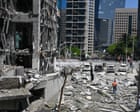Iran has struggled to respond effectively after Israel killed many of its top military commanders
It is a week since Israel began its largest attack ever on Iran, and in conventional military terms it is clear that Tehran is under extreme pressure. Israel has been able to achieve superiority over Iran’s skies at extraordinary speed, within hours of launching its surprise assault. Its military claimed on Monday to have knocked out 120 Iranian air defence systems through a mixture of air and drone strikes – about a third of Tehran’s pre-war total.
In response, Iran’s most effective weapon has been its stock of high-speed ballistic missiles, estimated at about 2,000 by Israel’s Defense Force (IDF) at the outset of hostilities last week. But the heavy targeting by Israel of launch sites in western Iran, in underground bases such as at Kermanshah – coupled with Israel’s grimly effective targeted killing of Iran’s top military commanders – have left Iran struggling to respond militarily and presenting a significant threat.



















